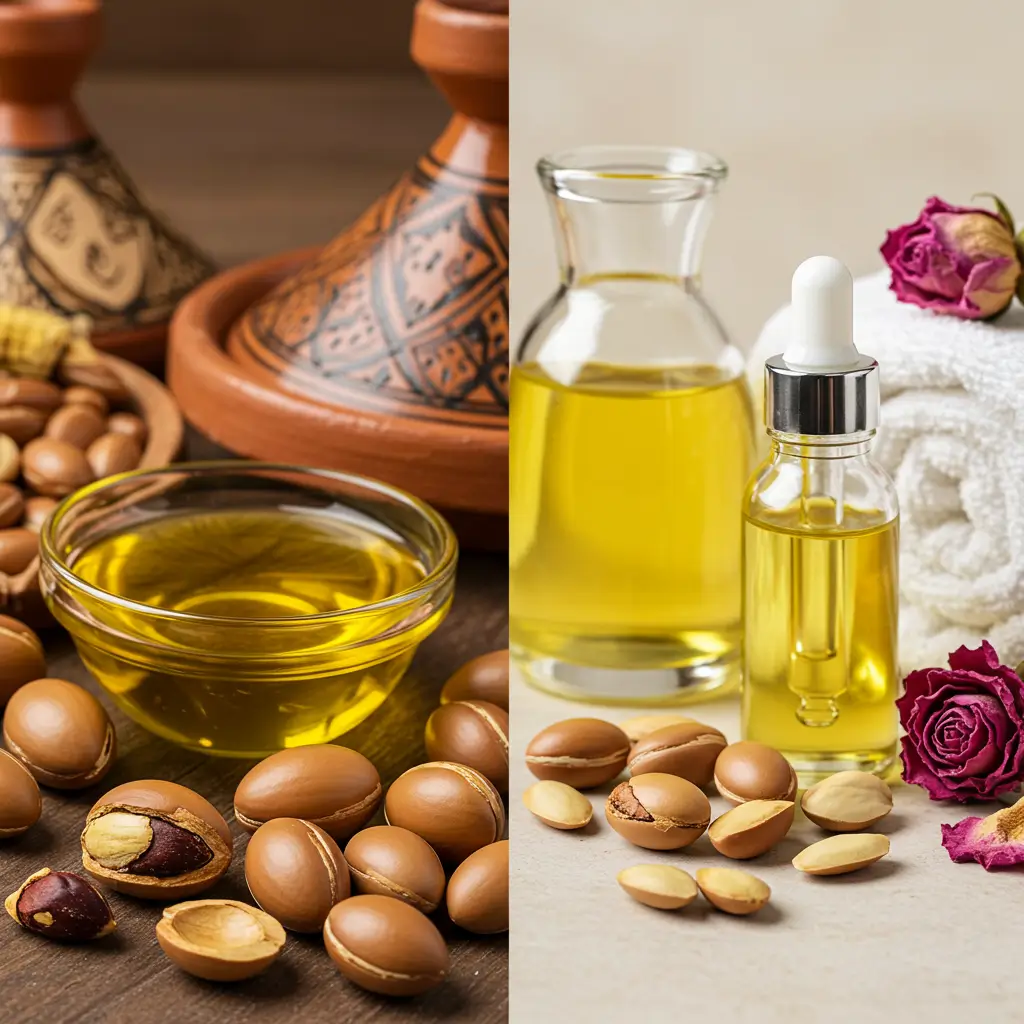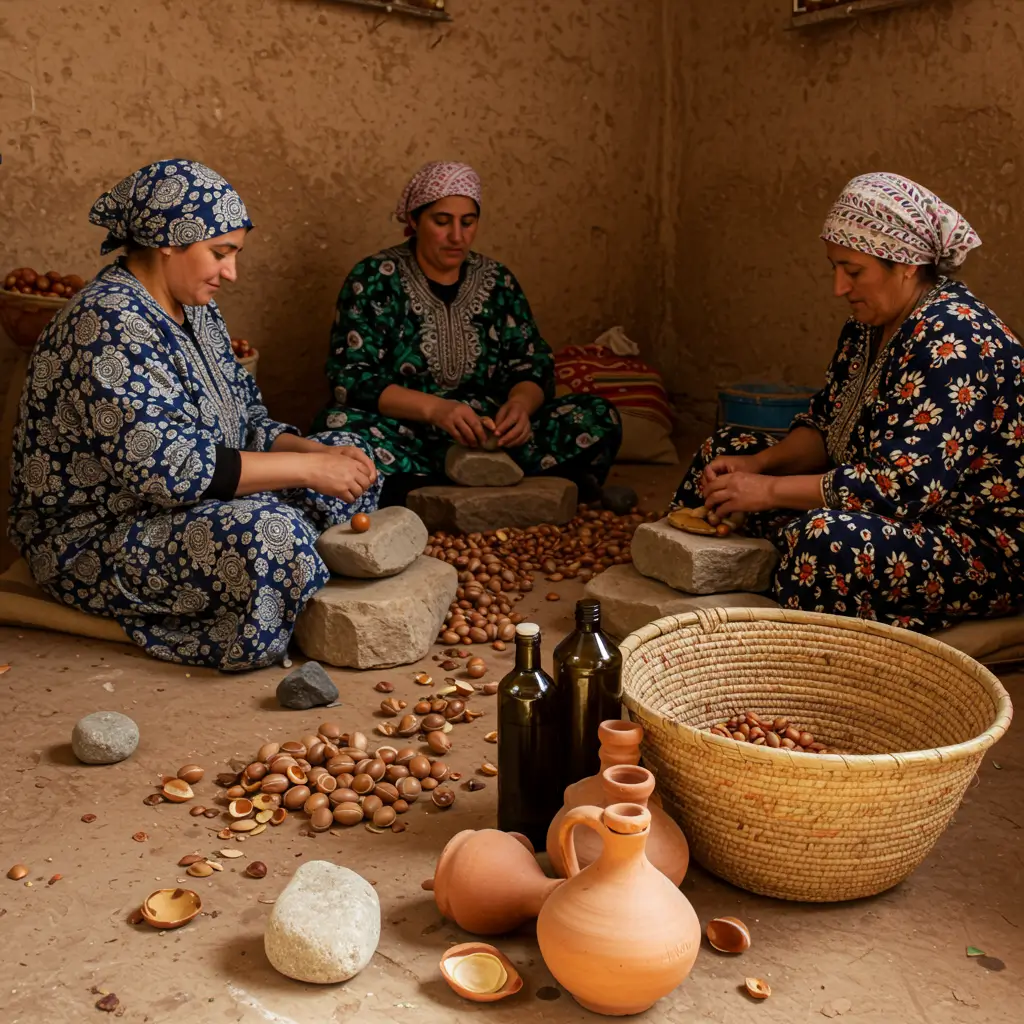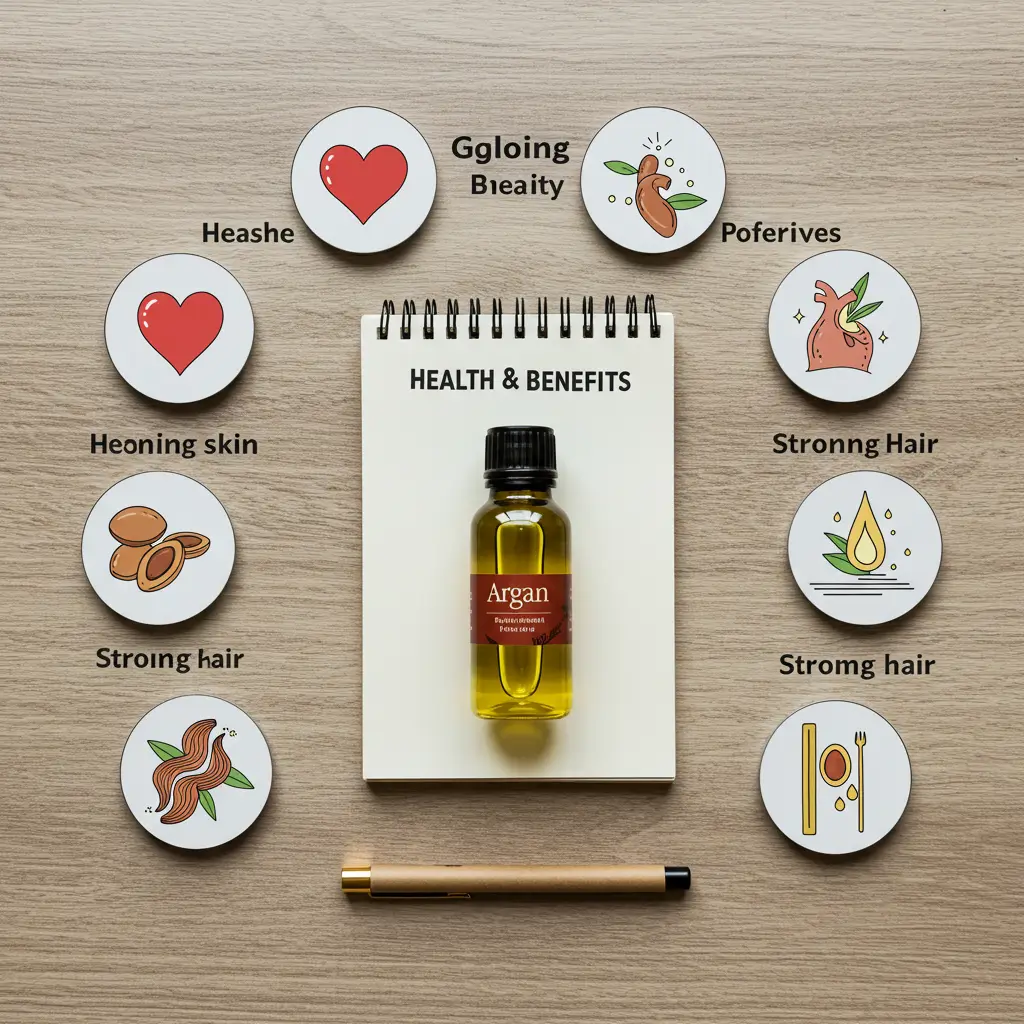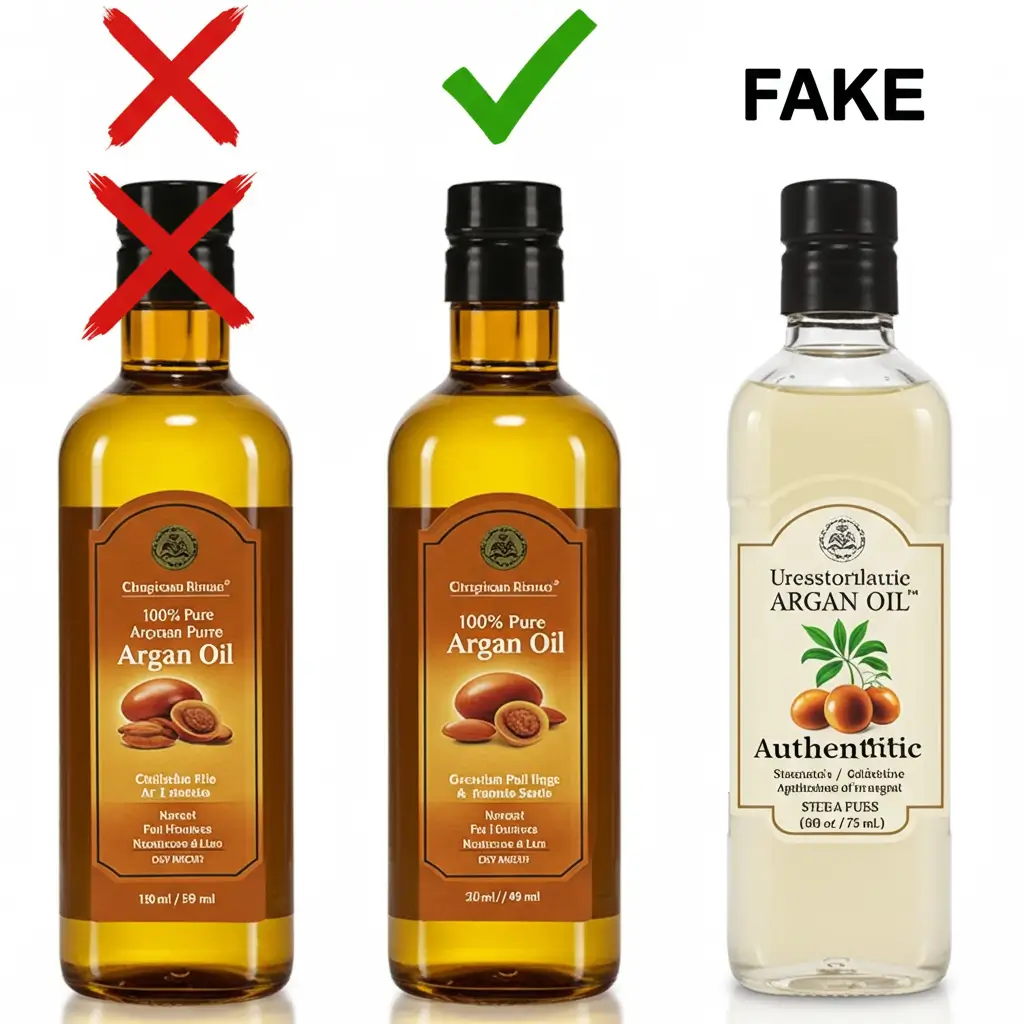The Ultimate Guide to Moroccan Argan Oil Culinary, Cosmetic & Beyond
What Is Moroccan Argan Oil?
Moroccan Argan Oil is a rare and precious oil extracted from the kernels of the Argania Spinosa tree, found almost exclusively in the arid regions of southwestern Morocco. Often referred to as “liquid gold,” this oil has been used for centuries by Berber communities for both culinary and cosmetic purposes.
With its rising global popularity, Argan Oil has become a sought-after natural ingredient across the food, skincare, and haircare industries. However, understanding what makes authentic Argan Oil so special—especially its origin, types, and production methods—is key to experiencing its full benefits.

Table of Contents
The Two Types: Culinary vs. Cosmetic Moroccan Argan Oil
Although derived from the same tree, culinary Argan Oil and cosmetic Argan Oil are processed very differently, which drastically affects their appearance, aroma, and usage.

Culinary Argan Oil:
- Roasted kernels give it a golden hue and a deep, nutty flavor.
- Typically used in Moroccan cuisine.
- Rich in Vitamin E and unsaturated fatty acids.
- Suitable for internal consumption.
Cosmetic Argan Oil:
- Extracted from raw, unroasted kernels.
- Light yellow or clear in color, with a mild or neutral aroma.
- Ideal for skin, hair, and nail care.
- Not safe for consumption.
✅ Important Note: Cosmetic Argan Oil should never be used in cooking.
How Is Authentic Moroccan Argan Oil Made?
Traditional Craftsmanship
Authentic Moroccan Argan Oil is still largely produced by Berber women’s cooperatives using time-honored techniques:
- Hand-harvesting the fruit from the Argan tree.
- Drying and manually cracking the hard shells to extract the kernels.
- Roasting (for culinary oil) or cold-pressing (for cosmetic oil).
- Filtering without additives to maintain purity.

This process is time-consuming—each liter of oil requires over 30kg of fruit and 10–20 hours of labor—but ensures top-tier quality and sustainability.
PGI Certification (Protected Geographical Indication)
To safeguard the oil’s authenticity and regional value, true Moroccan Argan Oil holds PGI status, meaning it must be:
- Produced only in specific Moroccan regions.
- Processed in traditional or certified modern facilities.
- Free of synthetic additives or blends.
Culinary Argan Oil: A Moroccan Kitchen Staple
Flavor Profile
Culinary Moroccan Argan Oil boasts a rich, nutty, and slightly toasty flavor. Its aroma resembles toasted hazelnuts, making it a gourmet ingredient ideal for both traditional and modern dishes.
Nutritional Benefits
- High in Oleic (Omega-9) and Linoleic (Omega-6) fatty acids.
- Packed with antioxidants, including Vitamin E and polyphenols.
- May support heart health, reduce inflammation, and aid in cholesterol regulation (source: NIH studies).
Common Argan Oil Uses in Cooking
- Amlou (Moroccan dip made with almonds and honey).
- Drizzled over couscous, tagines, grilled vegetables, and soups.
- Salad dressings, paired with citrus or vinegar.
- Finishing oil for roasted meats and warm flatbreads.
💡 For creative ideas, explore our 5 Delicious Recipes Using Culinary Argan Oil and Authentic Amlou Recipe.
Cosmetic Argan Oil: Skin, Hair & Nail Elixir

Skin Benefits Moroccan Argan Oil
- Acts as a powerful moisturizer for dry or aging skin.
- Rich in squalene and Vitamin E, which promote elasticity and cell regeneration.
- Helps reduce fine lines, wrinkles, and hyperpigmentation.
- May aid in treating acne due to its anti-inflammatory and non-comedogenic properties.
📖 Read: Using Argan Oil for Face & Skin: A Complete Guide
Hair Benefits
- Adds shine and controls frizz in curly or damaged hair.
- Nourishes the scalp, potentially improving conditions like dandruff.
- Can be used in DIY hair masks or as a leave-in treatment.
📖 Explore: Argan Oil for Hair: Benefits & How to Use It
Nail Benefits
- Strengthens brittle nails and moisturizes cuticles.
- Helps prevent nail breakage and splitting.
How to Use Argan Oil (Properly)
For Culinary Use:
- Use only Culinary Argan Oil labeled as edible.
- Store in a cool, dark place to maintain freshness.
- Use as a finishing oil, not for high-heat frying.
For Cosmetic Use:
- Apply a few drops directly to the face or body after cleansing.
- Use on damp hair ends or as an overnight mask.
- Massage into nails and cuticles regularly.
⚠️ Do not consume cosmetic-grade Argan Oil.
How to Choose & Buy High-Quality Moroccan Argan Oil

With popularity comes imitation. Here’s how to spot the real deal:
Label Checklist:
- Look for “100% Pure Argan Oil” or “Virgin Argan Oil.”
- Should state PGI designation if Moroccan origin.
- Cold-pressed method preferred.
Red Flags:
- Too cheap? Probably fake or diluted.
- Artificial fragrances or colorants = non-authentic.
Where to Buy Authentic Moroccan Argan Oil (For Cooking & More)
Looking for pure Culinary Argan Oil with deep, nutty flavor and real health benefits?
👉 Try this USDA-approved, 100% Organic Culinary Argan Oil, and rich in Vitamin E and antioxidants.
✅ Perfect for tagines, couscous, Amlou, and salad dressings
✅ Sustainably sourced from trusted Moroccan cooperatives
✅ Stored in dark glass bottles to preserve flavor and nutrients
🛒 Order now from our official Amazon store and taste the difference:
🔗 👉 Shop Culinary Argan Oil For Cooking on Amazon
🔗 👉 Shop Culinary Argan Oil For Cooking on Amazon
✨ Bonus: This oil is so pure, some of our customers even use it for skin and hair care. (But it’s crafted first and foremost for culinary excellence!)
📝 Not sure what to look for? Explore this UNESCO resource on authentic Argan Oil practices to understand the cultural and traditional foundations behind real Argan Oil.
Sustainability & Fair Trade
Supporting women-led cooperatives in Morocco directly contributes to:
- Economic empowerment of rural Berber communities.
- Environmental sustainability through protected harvesting.
- Preservation of an ancient cultural practice.
Many cooperatives are certified Fair Trade and reinvest profits into education, healthcare, and community growth.
Cultural Significance Moroccan Argan Oil
In Moroccan culture, Argan Oil is more than an ingredient—it’s a symbol of hospitality, tradition, and connection to the land.
- Culinary rituals: Amlou served at breakfast or with guests.
- Ceremonial uses: Included in weddings and newborn blessings.
- Passed-down wisdom: Recipes and skincare routines shared across generations.
FAQs (Geo-Optimized)
Is Argan Oil good for cooking?
Yes! Culinary Argan Oil is ideal for low to medium-heat dishes, finishing sauces, and drizzling over Moroccan meals like tagines and couscous.
Can I use cosmetic Argan Oil for food?
No. Cosmetic Argan Oil is not safe for consumption—it is processed differently and often unfit for culinary use.
Does Argan Oil expire?
Yes. Shelf life is usually 12 to 24 months. Store it in a cool, dark place in a glass bottle to prolong freshness.
What does authentic Argan Oil smell like?
Culinary Argan Oil has a nutty aroma, while cosmetic Argan Oil should have no strong smell—just mild and natural.
Where can I buy authentic Argan Oil in the U.S.?
Look for certified importers or fair-trade marketplaces. Avoid bargain buys unless verified.
Why Moroccan Argan Oil Belongs in Your Life
Whether you’re a culinary enthusiast or a natural beauty advocate, Moroccan Argan Oil delivers both flavor and function. Its unmatched nutritional profile, skin-healing properties, and cultural heritage make it more than a trend—it’s a timeless staple.
By choosing authentic Argan Oil, you’re not just benefiting yourself—you’re preserving a Moroccan tradition, supporting women’s empowerment, and embracing a product backed by centuries of wisdom.
Have you tried using it in your recipes? Tell us about your experiences!
There are no reviews yet. Be the first one to write one.

